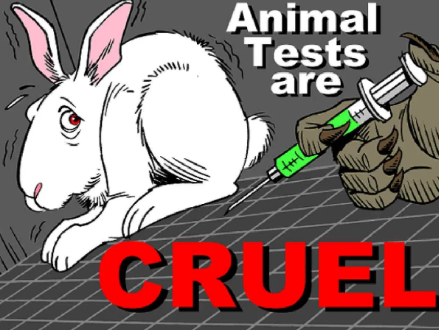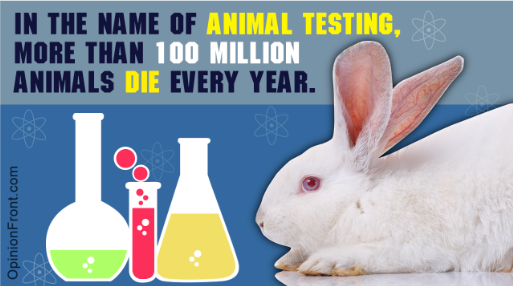The ethics of the cosmetic industry involve establishing standards and claims that govern the entire industry, with a focus on ensuring the well-being of both society and the environment. When it comes to imported beauty products that are chemically formulated, they undergo an animal testing procedure to ensure their safety, non-harmful outcomes, and hypoallergenic properties for the benefit of their consumers.
The beauty product industry is becoming increasingly focused on catering to the demands of a self-centred generation, often at the expense of ethics. To fulfil these demands, approximately 1000 animals are intentionally subjected to lethal poisoning, sacrificing their precious lives.
But among their cruel practices, most consumers as ethical buyers themselves said no to these unwanted deaths caused because of harsh physical tests on animals and agreed to use green products. They are trying to make indirect efforts to make others understand the importance of every single life over these lifeless chemically synthesized products and temporary glow by promoting and perceiving cruelty-free cosmetics and vegan beauty products.
Looking towards this tremendous change in the lookout of the world, alternatives for testing cosmetics came into the light no matter how expensive and time-consuming the option is. This is because switching to these alternatives is in favour of the company as it attracts a crowd of ethical customers. In some cases these claims of such companies to promote ethical marketing are untrue and if true, so for some means or benefits. In this blog, we will discuss some history, processes and methods of animal abuse, alternatives, and facts about the cosmetic industry.
Former Time Glimpse: Cosmetic Industry
Around 300 BC first test of chemicals on animals came up with several mechanisms that occur in the living body i.e., respiration, digestion, disease-causing microbes, germs, fermentation and many other internal processes. Not only this but also the consequences of giving out cosmetics or medicines without testing proved a poison outbreak leading to life loss of nearly 100 in 1937.
This past deadly epidemic forced the government to pass some strict laws against the prescription of uncertified chemical beauty products and animal testing came to light which darkened the life of innocent people.
Beauty products testing comprises face and irritation tests, force-feeding tests, hair and nails test, skin test, internal organs, microbes tests and many others on animals like rabbits, rodents and many others. Licence for testing accelerated the world with new scientific terms in 1665, Robert Hooke was the first who worked on germs and microbes giving new topics of research and which in turn helped scientists to understand the cause of deadly communicable and non-communicable diseases.
Testing And Precaution: Chemical Assault On Animal
Depending on environmental conditions and different types of industries various products are exposed to the general public going through the process of animal testing which is quite enough costly. There are mainly three types of cosmetic industry such as
Animal Testing: Treatment industry
Treatment industries cure dermatitis problems (skin, nails, hair and many others) and are followed by dermal penetration treatments or Draize tests which include skin absorption, and chemical analysis, usually on rats, rabbits, and rodents. This test results in side effects that could be skin or eye inflammation or corrosion, painful and swollen eyes, dermal and airway sensitization and LD50 (lethal dose results in the killing of 50 per cent of animals).
Cosmetics Beauty Industry
The beauty industry is quite competitive within the cosmetic industry and is a major cause of animal suffering. This industry is particular about the face, hair, nails, hand, and other parts of beauty and its tests cause endocrine disruption, irreversible damage to the tested part or dead-end.
Animal Testing And Personal Caring
The personal or grooming industry is mainly focused on self-caring ingredients like face or body cream, hair oils or gels, shaving cosmetics, perfume sprays, sunscreen etc. The personal caring industry ensures the reliability of face or skin cosmetics by skin allergic or skin sensitization test by applying chemicals (manufactured for the face or skin) on guinea pigs and analyzing the result afterwards. These tests cause itching, painful cracks on the skin, swollen skin, and red patches on tested animals like guinea pigs.
Alternative For Animal Testing
Considering the above outcomes, courteous and humanity, ethical consumers, the number of animal activists or rights groups, body shops with mobilising groups and other general people oppose and joining forces to set laws for banning testing on animals, taking action for animals and stand out for sustainable practices like avoiding inhuman treatment to animals and testing harmful ingredients, toxic chemicals, and non-biodegradable products.
Countries, the UK, India, Colombia, Norway, and European banned animal cruelty (European Citizen’s Initiative) and companies, running on cruelty-free cosmetics refused to re-thought physical tests on animals including E.L.F., Charlotte Tilbury, Farsali, Fenty Beauty, Fenty Skin, Glow Recipe and others.
Some steps and techniques used as an alternative are
Artificial Skin
The suffering of these animals forced us to think that giving health at the cost of life is senseless. UV radiation on pigskin and adding melanocytes provide us with a good number of different artificial or imitate skin tones for testing and comparing cosmetics.
Reusing Cosmetics
Several companies try to reuse already safe and tested ingredients for further testing of any new ingredient instead of testing chemical ingredients on animals. This alternative neglect the need for animal testing on a great scale.
Synthesized liver (detox organ)
The NoToX company analyses the potential risks of toxicity of cosmetics to human body parts by testing these industries’ built chemicals on the artificial or man-made model liver (good in detoxing chemicals) with high accuracy, sensitivity and specificity.
Body Tissues For Testing Cosmetics
Lab-grown tissues are used for testing harmful chemicals(detergent, makeup, tanning lotions, anti-agent creams and many other products) instead of animal cruelty on rabbits, mice, rats, monkeys, dogs, guinea pigs and many others.
If there are ethical consumers and companies, there are also who don’t get agree to end this testing on animals on imported ingredients and switched to the cruelty-free chemical ingredients concept. The reason for this downside is inappropriate results risk using a tiny part of the actual size organ and leaving testers with difficulty in transplanting such a small part. Also for some cosmetics finding alternatives is not easy and may be unknown to everyone. Some alternatives demand good time and money spending or investment which is not affordable.
Unknown facts about the cosmetics industry
In the cosmetic industry, some strategies are followed while testing animals, namely ‘Three R’. Three R’s are referred to as ‘Reductions’ (try to test less number of animals), ‘Refinement’ (approach to test carefully which gives less pain to animals as possible), and ‘Replacement’ (this strategy involves an alternative for testing cosmetics in place of animal testing method).
In all three strategies, replacement is a life-saving strategy and many organisations including PETA (People for the Ethical Treatment of Animals), CAAT (Center for Alternatives to Animal Testing), ECEAE, HSI and CeeTox in the USA prefer to manufacture cosmetics based on in vitro and non-animal tests no matter how much scientific equipment is need to use.
- The animal testing of imported chemicals is unreliable and meaningless as out of all animal cruelty tests 90 per cent of experiments get failed along with the lives of animals.
- Animals are exposed to 1000 time higher doses of ingredients than an individual get in their life. Every year 100 million animals are intentionally poisoned to death in the United state.
- It has been reported that by 2025, the cosmetic industry market will cross 2 trillion. But bright hope is that since March 2013, vegan chemical products sales have increased by 175 per cent.
- Cruelty-free Kitty’ is a website that provides information about the brand’s follow-up cruelty-free cosmetics concept.
- A good number of companies switched to vegan beauty products but the disappointing thing is that monetary reasons are the driving forces for such switching and such marketing strategies.
- 31 per cent of people within the age group, 18 to 28, 41 per cent of people within the age group, 29 to 59, and 45 per cent of people above 60 use cosmetics every day.
- Before testing cosmetics on animals, animals are supposed or made to feed and provide animal shelter so that negative mode traces if any will not affect or fluctuate the outcome of the test.
The cosmetic industry contributes towards the dead-end of forest life indirectly through animal testing (rabbits, mice, rats, monkeys, dogs, guinea pigs and many others) or enormous crises. These tests left animals with extreme pain, sickness, bleeding and convulsions (in the case of five feeding tests), breathing or inhalation problems, loss of seizures, damage to motor functions, disabilities, and may even face death in case of internal body part testing. The cosmetic industry ruled over every person’s beauty but got ruled out or crossed its limits in depriving animals of their fundamental right.
-ASHU RANI
Must read: THREAT MAGNIFIED: ESCALATION OF NUCLEAR PROLIFERATION








